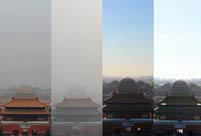BEIJING, Nov. 9 (Xinhua) -- The Communist Party of China (CPC) kicked off a key meeting here on Saturday, with a discussion on comprehensively deepening reform top on the agenda.
The four-day Third Plenary Session of the 18th CPC Central Committee will deliberate on a draft decision of the CPC Central Committee on "major issues concerning comprehensively deepening reforms."
The document, which pools the wisdom of the whole Party and from all aspects, has been widely expected as a tone-setter for the world's second-largest economy to advance the reform that has lasted for more than three decades.
Comprehensively deepening reform means the reform will be more systematic, integrated and coordinated. The CPC will work to speed up the development of a socialist market economy, democracy, cultural development, social harmony and ecological progress, according to the statement of a Political Bureau of the 18th CPC Central Committee meeting held on Oct. 29.
"We should let labor, knowledge, technology, management and capital unleash their dynamism, let all sources of wealth spread and let all people enjoy more fruits of development fairly," it added.
Since the groundbreaking Third Plenary Session of the 11th CPC Central Committee launched China's reform and opening-up drive in 1978, all the Third Plenary Sessions have taken reform and opening up as their central agenda.
Facing changing situations and tasks, a comprehensively deepened reform is needed for the building of a moderately prosperous society and the building of a prosperous, strong, democratic, culturally advanced, harmonious and modernized socialist country, as well as for the realization of the Chinese dream of national rejuvenation, according to the Political Bureau.
Yu Zhengsheng, a Standing Committee member of the Political Bureau of the 18th CPC Central Committee, has pledged that the reforms this time will be "broad, with major strength, and unprecedented."
"Inevitably they will strongly push forward profound transformations in the economy, society and other spheres," he added.
A REFORM THAT AFFECTS ALL
The decisions made at the key Party session 35 years ago changed the fate of all Chinese.
Shanghai resident Yang Huaiding, later known by his nickname "Millionaire Yang," is surely one of them.
A pioneer in China's budding capital market, he grossed his first barrel of gold through trading treasury bonds and then invested in the burgeoning stock market. In the late 1980s, he became a millionaire when most Chinese earned about 1,200 yuan (194 U.S. dollars in current rate) a year.
"I benefited from policy changes at the third plenary sessions of the 11th and 12th CPC Central Committee (in 1978 and 1984 respectively). I embody what reform and opening up has done for common Chinese," Yang told Xinhua.
Today, he still trades securities, at a time when a million yuan is no longer big money and the Shanghai bourse has joined New York, London and Tokyo to be a major economic indicator.
Like Yang, writer and Nobel laureate Mo Yan was one of those who seized opportunities that had not been presented for decades.
Born in a small village in east China's Shandong Province, Mo recalled that a number of people there starved to death in the early 1960s.
When he started writing in the 1970s, most Chinese had little access to literature except a few revolutionary novels and plays. Opening up to the outside world drastically liberated the mind of Chinese and allowed writers like Mo to record a rapidly changing society, in a freer way.
With his works flourishing since reform and opening up, he made it all the way to win the 2012 Nobel Prize for Literature.
Although not everyone became such household names, a lot more struggled to change life. More than 260 million rural youths went to cities for work and many left government jobs to set up private business. Once a taboo, private companies contributed about 60 percent of the country's gross domestic product (GDP) last year.
Liu Heung Shing, an American Pulitzer Prize winner, started and spent most of his career as a photojournalist in China.
"Only if you understand China's 30 years of history before reform will you know its leaders' determination to push forward the reform. They don't have a Plan B, because stability and development are impossible to achieve without reform," said Liu, who was born in Hong Kong but spent his childhood in his family's ancestral home of Fuzhou, southeast China, in the 1950s.

 Luxury-cars parade held in Dubai
Luxury-cars parade held in Dubai Special forces take tough training sessions
Special forces take tough training sessions Fire guts 22-storey Nigeria commercial building in Lagos
Fire guts 22-storey Nigeria commercial building in Lagos A girl takes care of paralyzed father for 10 years
A girl takes care of paralyzed father for 10 years A record of Beijing air quality change
A record of Beijing air quality change In pictures: explosions occur in Taiyuan
In pictures: explosions occur in Taiyuan Hello! Horror Halloween Celebration!
Hello! Horror Halloween Celebration!  The catwalk to the world of fashion
The catwalk to the world of fashion  Cruise trip to Taiwan
Cruise trip to Taiwan  Maritime counter-terrorism drill
Maritime counter-terrorism drill Loyal dog waits for master for six months
Loyal dog waits for master for six months Oriental education or western education?
Oriental education or western education? China in autumn: Kingdom of red and golden
China in autumn: Kingdom of red and golden National Geographic Traveler Photo Contest
National Geographic Traveler Photo Contest Chinese screen goddesses from Beijing Film Academy
Chinese screen goddesses from Beijing Film Academy Day|Week|Month